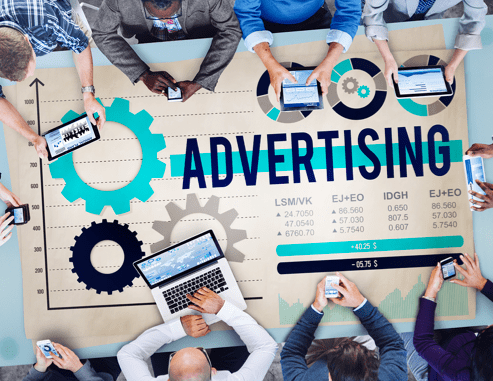As technology continues to evolve and its importance grows, modern companies employ various marketing and advertising strategies to reach potential customers and close sales.
From traditional media to digital marketing and in social media, marketing and advertising seem to be everywhere.
Part of this reality is due to the effectiveness of marketing and advertising strategies in driving success for companies of all shapes and sizes.
While they are sometimes used interchangeably, there are actually many differences between marketing and advertising. In basic terms, marketing is the process of identifying customer needs and determining how best to meet those needs.
In contrast, advertising is the practice of promoting a company and its products or services through paid channels. In other words, advertising is a component of marketing. But the differences do not end there.

Marketing is a business practice that involves identifying, anticipating and satisfying customer needs.
Effective marketing strategies help companies determine how best to serve their customer base, while increasing revenue at the same time.
In business-to-consumer (B2C) marketing, marketing efforts are directed towards consumers. In B2B marketing, marketing efforts are directed towards other businesses.
In both B2C and B2B efforts, there are many important factors to consider when developing a marketing strategy.
Orientation – Marketing orientation refers to the guiding principles of a business itself, and is often referred to as a business philosophy or company culture. Usually, organizations will decide on product orientation, sales, production or marketing.
Mix – The marketing mix serves as a decision-making guide for a company’s marketing efforts. The modern marketing mix will typically focus on the four elements: customer/customer, cost, convenience, and communication.
Environment – Marketing environment refers to every factor that can influence a company in implementing marketing strategy or decision making. In this context, companies must consider the internal environment within their organization.
External factors – such as the macro and micro environments – are also important to consider.
Market – Target market refers to the characteristics of a company’s ideal customer situation.
Research and segmentation efforts can help isolate the geographic and demographic factors that will help the company market and sell its products or services.
After careful evaluation of the orientation, mix, environment and market, it is possible to evaluate the costs and benefits of different marketing methods and strategies. This part of the planning process is very important, as there are many different ways a business can participate in marketing efforts.
1- Digital Marketing – Digital marketing refers to the application of marketing strategies to electronic communication devices, such as computers or smartphones. Digital marketing strategies often make use of search engines, email, websites, blogs, and other technologies to reach customers.
2- Social Media Marketing – A subset of digital marketing, social media marketing uses social platforms such as Facebook or Twitter to reach potential customers. This style of marketing allows companies to benefit from media gained from individuals outside their organization. Influencer marketing is an evolving part of social media marketing, where popular users are compensated for promoting a company’s products or services.
3- Global Marketing – Between globalization and the Internet, some of the largest companies in the world have developed global brands. Accordingly, global marketing enables these companies to employ a unified strategy to reach customers at the local, regional, national and international levels at the same time.
4- Relationship Marketing – Relationship marketing avoids invasive strategies like commercials or advertising and relies on happy customers instead. Relying on strategies that help retain and satisfy customers, relationship marketing strives to create a loyal, long-term customer base.
5- Brand management – Brand management attempts to create a link between the customer and the brand of a particular company. To do this, it is necessary to evaluate the company’s products or services as well as the logo, design, packaging and other elements. Brand management also evaluates aspects of the target market, direct competition, and existing customer relationships.
6- Product Development – Product development is the process of turning a business opportunity into a sellable product or service. Development can happen with existing products or new products. Successful product development involves many marketing concepts, including identifying customer needs as well as market research and analysis.

Advertising is a business practice where a company pays to place its message or brand in a specific location.
Companies make use of advertising to promote their products and services for sale as well as to establish their corporate culture and brands.
Employed correctly and strategically, advertising can lead to customer acquisition and increased sales.
Advertising creates a one-way channel of communication, where companies can broadcast impersonal messages to the general public.
Unlike other types of marketing or even public relations, companies have complete control over advertising.
When a business pays to place an ad, they have complete control over how the content in question is promoted.
There are countless benefits to a successful advertising campaign. In common practice, companies can take advantage of advertising to:
– Educating customers about the nature of products or services
– Convincing customers that products or services are superior
– Improve customers’ perception of the brand or culture
– Generate customer needs or desires for products or services
– Showcase new applications for products or services
– Publicize new products or services to potential customers
– Attract new customers to buy your products or services
– Maintain an existing customer base
1- Traditional Advertising – This term refers to the placement of advertising in traditional print and broadcast media. Common examples of traditional ads include newspaper ads, television ads, and radio ads.
2- Retail Advertising – These terms refer to advertising and placement within retail stores to maximize sales.
Common examples of retail advertising include product placement inside stores, advertisements on shopping carts and featured product displays.
3- Online Advertising – This term refers to the placement of advertising on the Internet in media and other websites. Common examples of online advertising include contextual ads in search engines, banners on websites, promotional videos, and sponsored content.
4- Mobile Ads – This term refers to ad placement on mobile phones and smartphones. Common examples of mobile ads include automated callers, banners for downloading apps, and click-to-call ads.
5- Outdoor Advertising – This term refers to placing advertising on outdoor structures, generally in heavily trafficked areas to attract the most attention. Common examples of outdoor advertising include billboards and signs on the outside of buildings and branded vehicles.
6- Pay-per-click (PPC) advertising – This term refers to an online ad placement designed to drive traffic to a company’s website. The companies derive extensive customer data from these ads, and only pay when users click the link.
For more information about the marketing and advertising services provided by our company, Event Solutions, do not hesitate to contact us via messages or call the numbers on our website.

Business Solutions Gate Group is a leading group in the field of providing services for businessmen and
investors, management and organization services for exhibitions and conferences, and facilities
management services, through its various companies and projects in the center of the capital, Muscat.
Solutions Gate all rights reserved | Powered By Brain-Socket.com